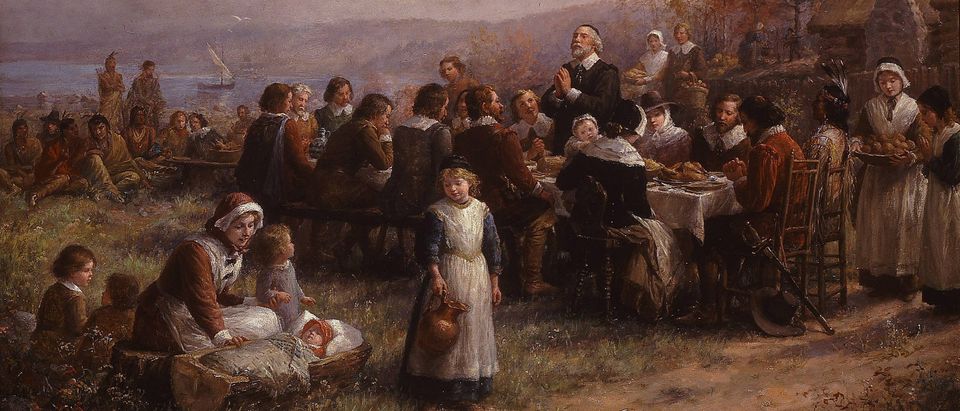Thanksgiving is among the greatest of our national holidays. But like so many of our holidays — Christmas, Easter, Memorial Day, Independence Day — the American public has lost a real understanding for why we celebrate it.
When the Pilgrims celebrated that famous feast in 1621, the calling of a special day of thanksgiving was by no means a novel idea. Days of prayer, fasting, and thanksgiving were all common at the time, often proclaimed in response to a particular peril or tragedy, or, more happily, in the aftermath of an exceptional blessing. The Pilgrims had undergone both. The year before, in 1620, they endured a wretched ten-week voyage across the Atlantic, followed by a harsh winter in which 58 of the original 102 colonists died. And yet, a bountiful harvest followed, with the invaluable aid of some local Indians, including a man, Squanto, who happened to know English! Moreover, the Pilgrims now enjoyed the freedom to worship God precisely as they saw fit. They hosted a dinner — attended by 53 Pilgrims and 90 Native Americans — and gave thanks.
The tradition continued. President Washington, in 1789, proclaimed the last day of November to be “a day of public thanksgiving and prayer, to be observed by acknowledging with grateful hearts the many and signal favours of Almighty God.” President Lincoln, in 1863, proclaimed a day of thanksgiving to acknowledge “the gracious gifts of the Most High God, who, while dealing with us in anger for our sins, hath nevertheless remembered mercy.”
In recent decades, American culture has increasingly sidelined Thanksgiving. But why?
There are many reasons. For one, the shift in our culture away from the belief in an active and intervening God has clearly undermined the importance that most people assign to the holiday. Additionally, Thanksgiving is sandwiched between two thoroughly commercialized holidays: Halloween and Christmas. America’s obsession with Halloween has swelled in recent years, and the Christmas shopping season has continued its encroachment into November.
And yet, for many Americans, the holiday endures in a meaningful way. And for the future of this country, it must endure.
For one, Thanksgiving taps deep into the soul of this nation – into a history and tradition that long predates even 1776. It’s an older and more traditional holiday than even Independence Day: and it’s every bit as American. So there’s that.
It’s also a time for families — including, importantly, extended families — to commune and break bread together. Thanksgiving is quintessentially family oriented. Holidays that revolve around families are vital in an age where the family unit is crumbling and severely impaired. Now, more than ever, we need regular family get-togethers.
But Thanksgiving, fundamentally, speaks to something even more transcendent. It speaks to our gratitude, and also, importantly, to our indebtedness.
Every Thanksgiving holiday, we say that we are thankful. That is well and good, but it begs a couple of questions.
First, and most obviously, what are you thankful for? And of course, there are a litany of things: employment, good health, family, food, shelter, and so on.
But your expression of thankfulness begs a second question: to whom are you thankful? Who, exactly, is the object of your thanks?
In day-to-day life, if someone does you a favor, you thank that person. You thank the one who gives you a ride while your car is in the shop; you thank the friend who brings you a meal when you’re sick. Thanks are given to a particular person.
When we gather over Thanksgiving and list the things for which we are thankful, it must be asked: who exactly are we thanking?
For those who believe in God — for those who believe in the reality and power of a sovereign, omniscient, omnipotent Creator — the answer is obvious.
But for those who don’t believe in divine Providence, there is, despite any protestations to the contrary, a certain vanity and meaninglessness behind the giving of thanks on Thanksgiving Day. Who are you thanking? Are you thanking Fate? Are you thanking Chance or Fortune? Are you thanking yourself for possessing the talent to achieve and accomplish great things? Who are you thanking?
Thanksgiving, properly celebrated, is a day set aside for people to express their gratitude and humility before a sovereign, holy, and all-powerful God. Our first president understood this, as did those who signed the Declaration of Independence, stressing that without the Creator, there could be no true human liberty or inalienable rights.
So many people today believe that God or the government or society owes them something.
But Thanksgiving is most meaningful when the giver of thanks understands that he or she is not entitled to anything. That even when times are difficult — even when tragedy comes — we still have many things for which to be thankful, because, in and of ourselves, we have no claim to anything. If nothing else, the mere fact that we are breathing — that we are alive — is sufficient to offer thanks to the Creator who breathes life into man and endows us with our inalienable rights. Whatever the circumstance, we are to be thankful just for that.
That is the meaning of Thanksgiving. Anything less than that, and the holiday is vain and hollow.
Now, more than at any time in our nation’s history, we need to approach Thanksgiving with hearts of sincerity, humility, repentance, and gratitude.
Jonathan Barth is an Associate Professor of History at Arizona State University and Associate Director of the Center for American Institutions. His Thanksgiving lecture series, as well as other educational content, is freely available on YouTube.
The views and opinions expressed in this commentary are those of the author and do not reflect the official position of the Daily Caller


